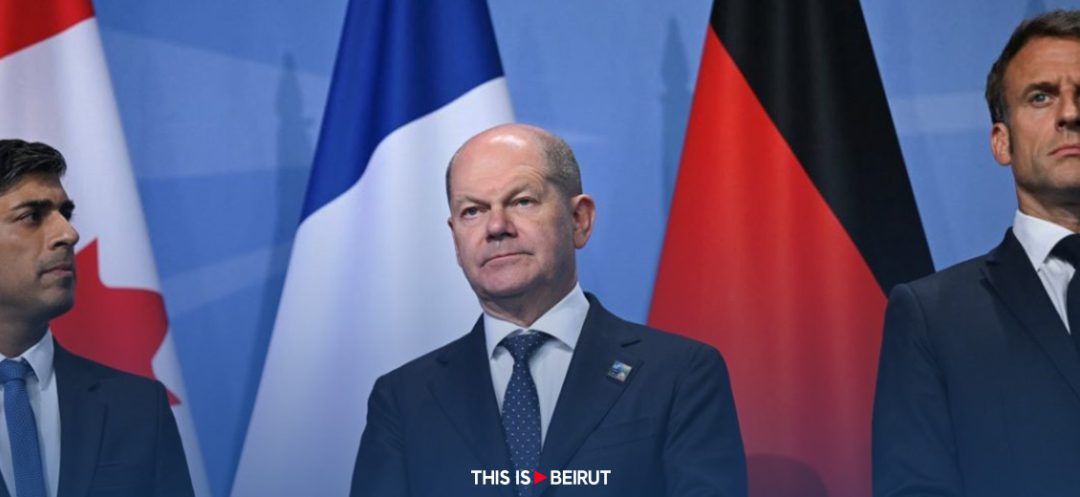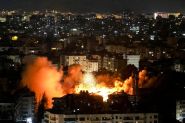- Home
- War in the Middle East
- Global Calls for De-escalation After Iran’s Barrage of Strikes on Israel

©(ANDREW CABALLERO-REYNOLDS/AFP)
Countries around the world condemned Iran's strikes on Israel late Saturday, warning the attack threatened to further destabilize the Middle East.
Here are some of the main reactions so far:
US President Joe Biden promised "ironclad" support for Israel after holding an urgent meeting with top security officials.
"I just met with my national security team for an update on Iran's attacks against Israel. Our commitment to Israel's security against threats from Iran and its proxies is ironclad," Biden said on X, posting a picture of the meeting in the White House Situation Room.
Qatar expressed "deep concern" following the strikes and called on "all parties to halt escalation" and "exercise maximum restraint." The gas-rich emirate, which has been engaged in weeks of talks with Israel and Hamas and mediated a hostage exchange between Tehran and Washington in September urged the international community to "take urgent action to defuse the tension and de-escalate."
UK Prime Minister Rishi Sunak in a statement condemned the "reckless" strikes, which he said "risk inflaming tensions and destabilizing the region. Iran has once again demonstrated that it is intent on sowing chaos in its own backyard."
Russia's foreign ministry expressed "extreme concern over the latest dangerous escalation in the region" and urged all sides to "show restraint".
"We are counting on the regional states to solve the existing problems with political and diplomatic means," the ministry said in a statement.
The European Union's foreign affairs chief Josep Borrell condemned the strikes as "an unprecedented escalation and a grave threat to regional security" in a message on X.
UN Secretary-General Antonio Guterres condemned "the serious escalation represented by the large-scale attack launched on Israel by the Islamic Republic of Iran".
"I am deeply alarmed about the very real danger of a devastating region-wide escalation," he added, calling on parties to "avoid any action that could lead to major military confrontations on multiple fronts in the Middle East".
NATO condemned Iran's overnight attack as "escalation" of regional unrest and urged restraint on all sides.
“We condemn Iran’s overnight escalation, call for restraint, and are monitoring developments closely. It is vital that the conflict in the Middle East does not spiral out of control,” spokesperson Farah Dakhlallah said.
Cairo's foreign ministry expressed its "deep concern" at the escalation of hostilities and called for "maximum restraint".
The ministry's statement also warned of the "risk of the regional expansion of the conflict", and added that Egypt would be "in direct contact with all parties to the conflict to try and contain the situation".
The Saudi foreign ministry issued a statement voicing its concern at the "military escalation" and calling on "all parties to exercise utmost restraint and spare the region and its peoples from the dangers of war".
It went on to urge the UN Security Council "to assume its responsibility towards maintaining international peace and security".
China's foreign ministry also urged restraint, characterizing the attack as "the latest spillover of the Gaza conflict" and calling for the implementation of a recent UN Security Council resolution demanding a ceasefire there, saying the "conflict must end now".
"China calls on the international community, especially countries with influence, to play a constructive role for the peace and stability of the region," it added.
France's Foreign Minister Stephane Séjourné said on X that "in deciding to take this unprecedented action, Iran has reached a new level in its acts of destabilization and is risking a military escalation".
Berlin's top diplomat also warned the attack would have a destabilising effect, and urged Tehran to halt the strikes.
"We condemn the ongoing attack -- which could plunge an entire region into chaos -- in the strongest possible terms," Foreign Minister Annalena Baerbock said on X.
"Iran and its proxies must stop this immediately," she continued, adding that Berlin stands "firmly by Israel".
Syria said Iran acted in self-defense with a massive overnight attack on Israel that Tehran said was in retaliation for a deadly Israeli strike on Tehran's consulate in Damascus.
"Iran's response... is a legitimate right to self-defense" against Israel, Syrian Foreign Minister Faisal Mekdad told his Iranian counterpart Hossein Amir-Abdollahian by phone, according to a report carried by state news agency SANA.
Indonesia's foreign ministry said it was "deeply concerned" over the escalation in tensions and called on the UN Security Council "to act immediately to de-escalate tensions and continue working towards lasting peace in the Middle East, including by ending the illegal occupation of Palestine and various violations of international law by Israel".
"A just settlement of the Palestinian issue through the two-state solution will be the key to maintaining regional security."
Iraq's President Abdel Latif Rashid called for a "reduction of tensions", warned against the "spread of conflict" and said emphasized" the need to stop the aggression against the Gaza Strip and to find a solution to the Palestinian question, given this is a fundamental element to the stability of the region".
Canadian Prime Minister Justin Trudeau told reporters in Ottawa that his country "unequivocally condemns Iran's airborne attacks", adding: "We stand with Israel."
"After supporting Hamas' brutal October 7 attack, the Iranian regime's latest actions will further destabilise the region and make lasting peace more difficult," he added.
Spanish Prime Minister Pedro Sanchez called for restraint, saying Madrid "will always condemn all forms of violence which threaten the security and the well-being of innocent civilians."
"The response from all international leaders requires responsibility and restraint. We must learn the lessons of history and find a means of resolving conflicts diplomatically, avoiding further escalation at all costs," he said
The office of Argentine President Javier Milei expressed in a statement its "solidarity and unwavering commitment" to Israel in the face of the attacks.
It added that Argentina "emphatically supports the State of Israel in the defence of its sovereignty, especially against regimes that promote terror", noting an Argentine court recently held Iran responsible for bomb attacks on the Israeli embassy and a Jewish community centre in Buenos Aires in the 1990s.
Italy's Foreign Minister Antonio Tajani said his country was following the situation "with attention and concern" and was "ready to manage any kind of scenario".
Turkey Foreign Minister Hakan Fidan spoke by telephone with his Iranian counterpart "and stated that we do not wish for a new escalation in the region", a diplomatic source said.
Ukraine's foreign ministry said Kyiv "strongly condemns Iran's massive air attack" which also "demonstrates why it is critical that all of the free world's forces are consolidated to defend the global borders of democracy."
Mexico's government said it "condemns the use of force in international relations and calls on the parties to use self-restraint and seek solutions peacefully" to avoid a wider regional conflict.
Pope Francis on Sunday made a "pressing appeal" against a "spiral of violence" after Iran's unprecedented missile and drone attack on Israel, warning of a potential regional conflagration.
With AFP
Here are some of the main reactions so far:
United States
US President Joe Biden promised "ironclad" support for Israel after holding an urgent meeting with top security officials.
"I just met with my national security team for an update on Iran's attacks against Israel. Our commitment to Israel's security against threats from Iran and its proxies is ironclad," Biden said on X, posting a picture of the meeting in the White House Situation Room.
I just met with my national security team for an update on Iran’s attacks against Israel. Our commitment to Israel’s security against threats from Iran and its proxies is ironclad. pic.twitter.com/kbywnsvmAx
— President Biden (@POTUS)I just met with my national security team for an update on Iran’s attacks against Israel. Our commitment to Israel’s security against threats from Iran and its proxies is ironclad. pic.twitter.com/kbywnsvmAx
— President Biden (@POTUS) April 13, 2024
Qatar
Qatar expressed "deep concern" following the strikes and called on "all parties to halt escalation" and "exercise maximum restraint." The gas-rich emirate, which has been engaged in weeks of talks with Israel and Hamas and mediated a hostage exchange between Tehran and Washington in September urged the international community to "take urgent action to defuse the tension and de-escalate."
Britain
UK Prime Minister Rishi Sunak in a statement condemned the "reckless" strikes, which he said "risk inflaming tensions and destabilizing the region. Iran has once again demonstrated that it is intent on sowing chaos in its own backyard."
Russia
Russia's foreign ministry expressed "extreme concern over the latest dangerous escalation in the region" and urged all sides to "show restraint".
"We are counting on the regional states to solve the existing problems with political and diplomatic means," the ministry said in a statement.
EU
The European Union's foreign affairs chief Josep Borrell condemned the strikes as "an unprecedented escalation and a grave threat to regional security" in a message on X.
The EU strongly condemns the unacceptable Iranian attack against Israel.
This is an unprecedented escalation and a grave threat to regional security.
— Josep Borrell Fontelles (@JosepBorrellF)The EU strongly condemns the unacceptable Iranian attack against Israel.
This is an unprecedented escalation and a grave threat to regional security.— Josep Borrell Fontelles (@JosepBorrellF) April 13, 2024
UN
UN Secretary-General Antonio Guterres condemned "the serious escalation represented by the large-scale attack launched on Israel by the Islamic Republic of Iran".
"I am deeply alarmed about the very real danger of a devastating region-wide escalation," he added, calling on parties to "avoid any action that could lead to major military confrontations on multiple fronts in the Middle East".
NATO
NATO condemned Iran's overnight attack as "escalation" of regional unrest and urged restraint on all sides.
“We condemn Iran’s overnight escalation, call for restraint, and are monitoring developments closely. It is vital that the conflict in the Middle East does not spiral out of control,” spokesperson Farah Dakhlallah said.
Egypt
Cairo's foreign ministry expressed its "deep concern" at the escalation of hostilities and called for "maximum restraint".
The ministry's statement also warned of the "risk of the regional expansion of the conflict", and added that Egypt would be "in direct contact with all parties to the conflict to try and contain the situation".
Saudi Arabia
The Saudi foreign ministry issued a statement voicing its concern at the "military escalation" and calling on "all parties to exercise utmost restraint and spare the region and its peoples from the dangers of war".
It went on to urge the UN Security Council "to assume its responsibility towards maintaining international peace and security".
China
China's foreign ministry also urged restraint, characterizing the attack as "the latest spillover of the Gaza conflict" and calling for the implementation of a recent UN Security Council resolution demanding a ceasefire there, saying the "conflict must end now".
"China calls on the international community, especially countries with influence, to play a constructive role for the peace and stability of the region," it added.
France
France's Foreign Minister Stephane Séjourné said on X that "in deciding to take this unprecedented action, Iran has reached a new level in its acts of destabilization and is risking a military escalation".
La France condamne avec la plus grande fermeté l’attaque déclenchée par l’Iran contre Israël.
En décidant d’une telle action sans précédent, l’Iran franchit un nouveau pallier dans ses actions de déstabilisation et prend le risque d’une escalade militaire.
1/2
— Stéphane Séjourné (@steph_sejourne)La France condamne avec la plus grande fermeté l’attaque déclenchée par l’Iran contre Israël.
— Stéphane Séjourné (@steph_sejourne) April 13, 2024
En décidant d’une telle action sans précédent, l’Iran franchit un nouveau pallier dans ses actions de déstabilisation et prend le risque d’une escalade militaire.
1/2
Germany
Berlin's top diplomat also warned the attack would have a destabilising effect, and urged Tehran to halt the strikes.
"We condemn the ongoing attack -- which could plunge an entire region into chaos -- in the strongest possible terms," Foreign Minister Annalena Baerbock said on X.
"Iran and its proxies must stop this immediately," she continued, adding that Berlin stands "firmly by Israel".
Syria
Syria said Iran acted in self-defense with a massive overnight attack on Israel that Tehran said was in retaliation for a deadly Israeli strike on Tehran's consulate in Damascus.
"Iran's response... is a legitimate right to self-defense" against Israel, Syrian Foreign Minister Faisal Mekdad told his Iranian counterpart Hossein Amir-Abdollahian by phone, according to a report carried by state news agency SANA.
Indonesia
Indonesia's foreign ministry said it was "deeply concerned" over the escalation in tensions and called on the UN Security Council "to act immediately to de-escalate tensions and continue working towards lasting peace in the Middle East, including by ending the illegal occupation of Palestine and various violations of international law by Israel".
"A just settlement of the Palestinian issue through the two-state solution will be the key to maintaining regional security."
Iraq
Iraq's President Abdel Latif Rashid called for a "reduction of tensions", warned against the "spread of conflict" and said emphasized" the need to stop the aggression against the Gaza Strip and to find a solution to the Palestinian question, given this is a fundamental element to the stability of the region".
Canada
Canadian Prime Minister Justin Trudeau told reporters in Ottawa that his country "unequivocally condemns Iran's airborne attacks", adding: "We stand with Israel."
"After supporting Hamas' brutal October 7 attack, the Iranian regime's latest actions will further destabilise the region and make lasting peace more difficult," he added.
Spain
Spanish Prime Minister Pedro Sanchez called for restraint, saying Madrid "will always condemn all forms of violence which threaten the security and the well-being of innocent civilians."
"The response from all international leaders requires responsibility and restraint. We must learn the lessons of history and find a means of resolving conflicts diplomatically, avoiding further escalation at all costs," he said
Argentina
The office of Argentine President Javier Milei expressed in a statement its "solidarity and unwavering commitment" to Israel in the face of the attacks.
It added that Argentina "emphatically supports the State of Israel in the defence of its sovereignty, especially against regimes that promote terror", noting an Argentine court recently held Iran responsible for bomb attacks on the Israeli embassy and a Jewish community centre in Buenos Aires in the 1990s.
Italy
Italy's Foreign Minister Antonio Tajani said his country was following the situation "with attention and concern" and was "ready to manage any kind of scenario".
Turkey
Turkey Foreign Minister Hakan Fidan spoke by telephone with his Iranian counterpart "and stated that we do not wish for a new escalation in the region", a diplomatic source said.
Ukraine
Ukraine's foreign ministry said Kyiv "strongly condemns Iran's massive air attack" which also "demonstrates why it is critical that all of the free world's forces are consolidated to defend the global borders of democracy."
Mexico
Mexico's government said it "condemns the use of force in international relations and calls on the parties to use self-restraint and seek solutions peacefully" to avoid a wider regional conflict.
Vatican
Pope Francis on Sunday made a "pressing appeal" against a "spiral of violence" after Iran's unprecedented missile and drone attack on Israel, warning of a potential regional conflagration.
With AFP
Read more




Comments